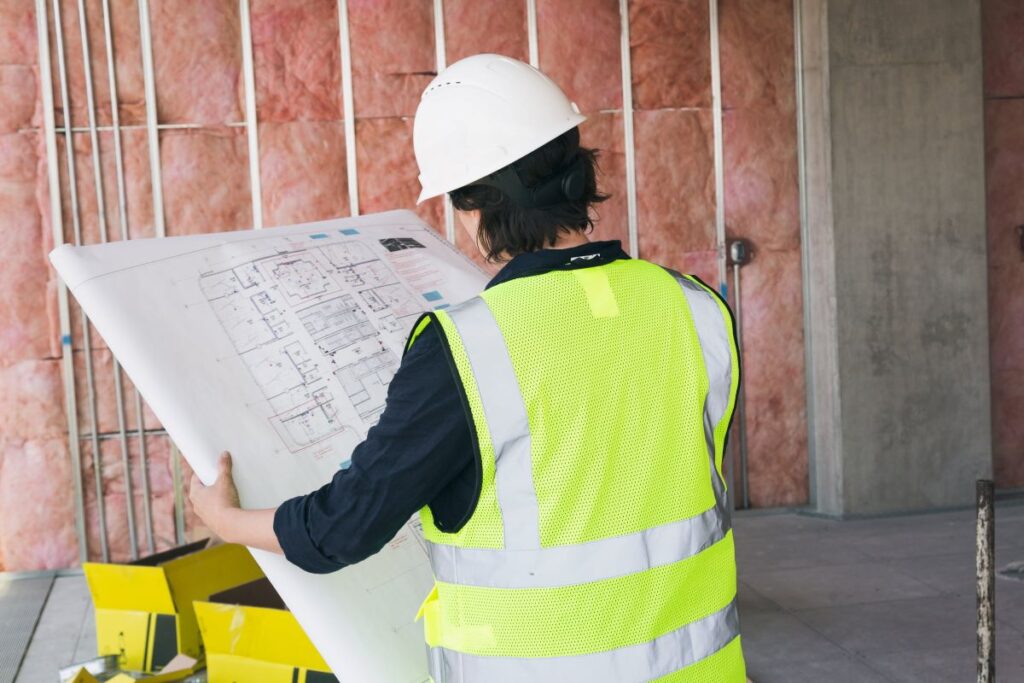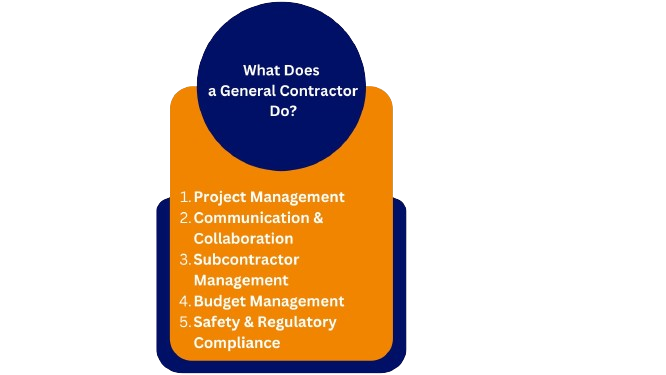Introduction
Whether residential, commercial, or industrial, construction projects are complex undertakings that need careful coordination of many tasks, workers, and resources. A key figure stands at the heart of these operations: the General Contractor.
What is general contractor?
Think of a general contractor as an orchestra conductor, but instead of musicians, they’re coordinating builders, electricians, plumbers, and more. Their job is to take the blueprints and turn them into real buildings, all while keeping things on time and within budget.
What does a general contractor do?

- Coordinates all aspects of the construction project from start to finish
- Manages relationships between clients, architects, subcontractors, and suppliers
- Ensures compliance with building codes, safety regulations, and project specifications
- Handles the logistical challenges of construction, including scheduling and resource allocation
General contractor expertise and management skills can make a big difference. They can mean the difference between a smooth, successful build and a problematic, delayed one.
Table of Contents
II. What Does a General Contractor Do?
General contractors play many roles in construction projects, assuming responsibility for project execution. Their core functions:

Project Management:
- Oversee and coordinate all aspects of daily construction operations
- Develop and maintain critical path schedules, ensuring efficient task sequencing
- Keeping the project on track and meeting important deadlines
- Use project management software and methodologies to optimize workflow
Communication & Collaboration:
- Act as the central point of contact between stakeholders (clients, architects, engineers, and subcontractors)
- Ease clear, consistent communication channels to manage expectations and mitigate potential conflicts
- Conduct regular project meetings and provide detailed progress reports
- Manage change orders and scope adjustments effectively
Subcontractor Management:
- Find and hire skilled workers for specific jobs (like plumbers and electricians)
- Coordinate subcontractor schedules to maximize efficiency and minimize conflicts
- Implement quality control measures to ensure subcontractor work meets project specifications
- Manage subcontractor payments.
Budget Management:
- Develop and maintain detailed project budgets
- Install cost control measures and conduct regular financial reviews
- Identify and mitigate potential cost overruns through value engineering and procurement
- Manage cash flow and ensure timely payments to suppliers and subcontractors
Safety & Regulatory Compliance:
- Develop and enforce comprehensive site-specific safety plans
- Ensure compliance with OSHA regulations and industry best practices
- Facilitate inspections throughout the construction process
- Adhere to local, state, and federal building codes and regulations
III. Benefits of Hiring a General Contractor
Engaging a general contractor (GC) offers several advantages for construction projects:
Streamlined Project Execution:
- They coordinate many trades and vendors, optimizing schedules and workflows
- This centralized management reduces the client’s administrative burden and minimizes communication gaps
- GCs leverage established relationships with subcontractors and suppliers to speed up processes
Expertise & Experience:
- GCs bring comprehensive construction knowledge, including best practices and industry trends
- Their experience allows for efficient problem-solving and overseeing issues
- They have an in-depth understanding of local building codes, permitting processes, and regulation
- GCs provide valuable input during pre-construction phases, potentially improving project feasibility and design
Quality Control & Assurance:

- They oversee and coordinate subcontractors, ensuring work meets or exceeds project specifications
- Regular inspections and progress evaluations to maintain high standards
- – GCs are accountable for the quality of the project, providing a single point of responsibility
Budget Management & Risk Mitigation:
- GCs develop detailed project budgets and implement cost-control strategies
- They identify potential cost savings through value engineering
- Risk assessment and mitigation strategies are employed to minimize unforeseen expenses
- -GCs establish relationships with insurance providers, offering more comprehensive coverage at competitive rates
IV. Considerations When Hiring a General Contractor
Selecting an appropriate general contractor is crucial for project success. Key factors to check include:
Experience & Qualifications:
- Look for a contractor who’s done projects like yours before
- Check if they have the right licenses for your area
- Ask about their training and how long they’ve been in business
- See examples of their past work
References & Reputation:
- Ask for references from past clients
- Analyze performance from previous projects, including budget adherence and schedule compliance
- Review industry rankings
- Look up their standing with professional associations and regulatory bodies
Communication Style & Project Management Approach:
- Effective communication: Choose a general contractor who communicates clearly and regularly. They should be responsive to your questions and provide updates on the project’s progress.
- Project management style: Make sure their project management style matches what you expect. This includes how they handle scheduling, coordination, and problem-solving.
Insurance & Warranties:
- Adequate insurance: Verify that the general contractor carries enough insurance coverage. This includes general liability and workers’ compensation. This protects you from potential liabilities in case of accidents or damages.
- Warranties on work: Inquire about the warranties they offer on their work. A reputable general contractor stands behind their work.
Technological Capabilities:
- Evaluate their proficiency with Building Information Modeling (BIM) and other relevant technologies
- Assess their capability to integrate with your existing project management systems





